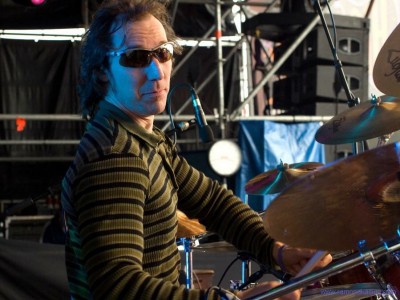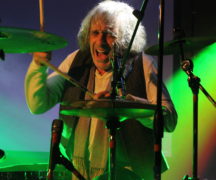By DAVID DUPONT
BG Independent News
Kofi Baker doesn’t play the music of Cream as a tribute to the 1960s super group.
And he doesn’t play it because that’s what his father, Ginger Baker, the drummer with Cream and later Blind Faith, played it
Baker, who’s been a drummer longer than he can remember, performs the music associated with Cream and Blind Faith because that’s the style that allows him to express who he is as a musician, freewheeling and genre defying.
“The Cream stuff is all improvised,” Baker said in a recent telephone interview. “That’s why I like playing it.”
Baker will bring his Cream Experience featuring guitarist Chris Shutters and bassist Frankie May to Howard’s Club H Friday, Aug. 24. The band starts a little after 9 p.m.
“The music I play has nothing to do with my dad,” he said. “It’s a style I was brought up in, and I really like it.”
(This interview was conducted in December before a Howard’s show that was cancelled.)
The trio is not a “cover band” that listens to the records and tries to replicate them. They play the melodies of the songs, flipping their grooves as the mood suits them and then launch into their own exploration.
“It’s been a challenge my whole life to play in a project that allows me the freedom to play differently every night.” Baker said. This band allows him to do just that.
He launched the Cream Experience after hearing his father, Eric Clapton, and Jack Bruce, who died in 2014, during their 2005 reunion tour.
This was the sound imbedded in his soul since infancy. His father was his primary teacher. Baker realized this was the sound that gave him the freedom he desired.
“That’s why this is kind of the perfect thing. Why I’ve fallen into it and really enjoy it,” he said. “Every night it’s a completely different ball of wax. … It’s always different every night because we come to it with a different attitude.”
Audience interaction can help shape those improvisations. If the band hits a groove, quotes the melody from another song, and the crowd cheers “then we may move into different things. It really depends on the vibe that night, how the stars align.”
The guitar, bass, and drums trio provides the right balance, leaving plenty of room to roam. “When you start bringing more members of the band you have less freedom because you have to sit back and let other people do their thing.”
Shutters, of Toledo, has been a regular with his band for two years. Shutters first joined earlier as an emergency sub for another guitarist who celebrated too hard on his birthday and ended up injuring himself when he fell down the stairs.
Baker said he remembers heading to the gig making calls to try to find another musician to join them that night. Shutters ended up answering the call, and impressed Baker, who started using him on dates in the Midwest.
Bassist May is another stalwart on the Toledo scene, who has toured nationally with Crystal Bowersox. He and Shutters frequently share the stage.
Baker said that ability to jam freely comes at a price.
While he played drums since before he can remember, he really got serious at age 13, Baker started gigging at 14.
From then until well into his twenties, he practiced eight hours a day. He recalls his father’s approach to teaching, which emphasized rigor and flexibility.
Baker said the elder Baker taught him the standard drum rudiments, but showed him how he could extend that practice by displacing the pattern by an eighth note, then by starting them with the left hand. That takes the 40 rudiments, and extends them into thousands of patterns, he said.
Though his style is rooted in jazz, he’s too “heavy” a player for most jazz groups. He’s played fusion with Frank Zappa, but that’s not quite what he does.
“I like grooving,” Baker said. “I’m a psychedelic drummer. … I just like to go where I can go.”
That can mean West African rhythms, or Latin beats, or any number of traditions that he’s explored.
That means constant practice, four hours a day if he can, but at least an hour or two, he said. “The problem is the more you learn, the more practice you have to do to keep it up. … You could probably practice 100 years, eight hours a day, every day and never learn everything.”
Baker likened practicing to a writer developing a vocabulary. Having a large vocabulary, he said, allows you to express yourself in great detail.
“When you’re improvising you can go wherever you want,” Baker said. “Any possible thing you can think of, you can play.”





